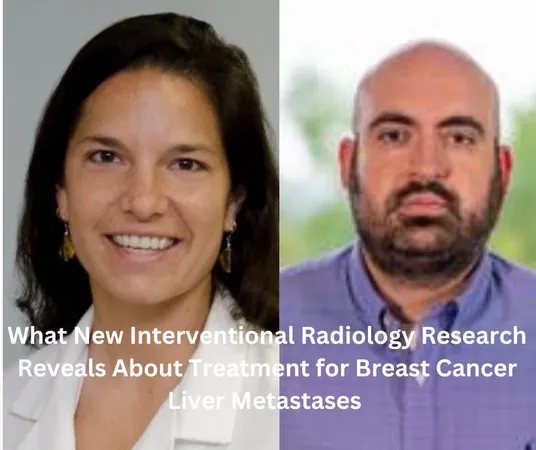
Groundbreaking Study Shows Immunotherapy and Radioembolization Could Extend Life for Patients with Breast Cancer Liver Metastases
2025-04-08
Author: Ming
Recent Research Findings
Recent research presented at the Society of Interventional Radiology (SIR) conference has revealed that the combination of immunotherapy and transarterial radioembolization (TARE) could significantly improve survival rates for patients suffering from liver metastases due to breast cancer. This finding comes at a critical time, as approximately 20% of breast cancer deaths are attributed to liver metastasis.
Study Overview
Lead researcher Dr. Amy Deipolyi, M.D., who specializes in treating breast cancer, noted that half of all breast cancer patients develop metastatic disease, often with the liver as a primary site of metastasis. This alarming statistic has prompted the need for effective treatment strategies.
Study Details
In their robust study involving 418 patients, the research team compared TARE/immunotherapy against several other combinations, including transarterial chemoembolization (TACE)/immunotherapy and TARE/chemotherapy. The results were striking: patients receiving the TARE/immunotherapy combination had a median overall survival of 38 months and a noteworthy three-year survival rate of 52%. In contrast, the other treatment combinations had lower survival rates, with TACE/immunotherapy at 48%, TARE/chemotherapy at 45%, and TACE/chemotherapy at 40%.
Significance of Findings
Dr. Deipolyi emphasized that these findings align with previous studies, suggesting consistent benefits from Y-90 radioembolization over traditional chemoembolization methods. "The evidence clearly indicates that Y-90 not only delivers superior imaging results and more objective responses but also is better tolerated with fewer adverse effects," she stated.
Methodology and Data Source
This comprehensive study is significant not only because of its size but also due to the methodology. The patient cohort was sourced from a query of 68 health-care organizations using the federated TriNetX database, which provides real-time access to vast amounts of clinical research data from over 145 hospitals.
Hope for the Future
This research represents a hopeful advance in treating breast cancer patients with liver metastases, opening new avenues for potentially life-saving therapies. As the medical community works to refine these treatments, further investigations will be vital in ensuring the best possible outcomes for patients facing this challenging prognosis.
Ongoing Discussions
For ongoing discussions and insights on the topic, experts like Dr. Deipolyi and her team continue to share their knowledge at relevant medical forums. As the exploration into effective treatments evolves, patients and healthcare providers remain hopeful for new developments that will drive better survival rates in this population.


 Brasil (PT)
Brasil (PT)
 Canada (EN)
Canada (EN)
 Chile (ES)
Chile (ES)
 Česko (CS)
Česko (CS)
 대한민국 (KO)
대한민국 (KO)
 España (ES)
España (ES)
 France (FR)
France (FR)
 Hong Kong (EN)
Hong Kong (EN)
 Italia (IT)
Italia (IT)
 日本 (JA)
日本 (JA)
 Magyarország (HU)
Magyarország (HU)
 Norge (NO)
Norge (NO)
 Polska (PL)
Polska (PL)
 Schweiz (DE)
Schweiz (DE)
 Singapore (EN)
Singapore (EN)
 Sverige (SV)
Sverige (SV)
 Suomi (FI)
Suomi (FI)
 Türkiye (TR)
Türkiye (TR)
 الإمارات العربية المتحدة (AR)
الإمارات العربية المتحدة (AR)